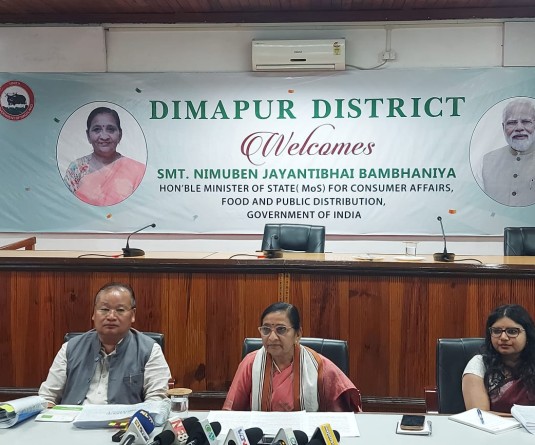 2020.jpg)
Stresses to curtail students drop out rate, call to root out bogus teachers
Our Correspondent
Kohima | December 5
The need to identify strategies to curtail student dropout rates, root out ‘bogus’ and unqualified teachers, strengthening of early childhood care and education system and how the state can make Teacher Eligibility Test (TET) a prerequisite qualification for recruitment of teachers, were underscored during the panel discussion on National Education Policy (NEP) 2020 here today.
It was organised by Nagaland Education Association (NEA) in collaboration with Directorate of School Education, Nagaland, with the aim to have a healthy discussion amongst the educationists and gain deeper understanding of the NEP and gather views for effective implementation of the policy.
The panellists of the discussion included; Shanavas C, Principal Director, School Education, Nagaland; Vipralhou Kesiezie, former Director, SCERT Nagaland; Prof Buno Liegise, Professor, Department of Education, Nagaland University; Pheluopfelie Kesiezie, Advisor, All Nagaland Private Schools Association; Prof Rakesh Rai, Professor & Head, Department of Education, NU and Asano Sekhose, chairperson, Nagaland Board of School Education.
‘Build up our nation into a house of knowledge and wisdom’
In the keynote address, NEA vice president Dr Bweyhunle Khing said that NEP 2020 seeks to change the entire gamut of the structure of Indian education and also seeks to reform and reorganize the structure of education from early childhood education to the university, professional education, adult education and lifelong education.
Stating that it also lays emphasis on cultures of researches in all the fields, promotion of languages, arts and culture and covers the use of technology in education, online and digital education, she said it is the responsibility of not only the teachers, students and parents but also the educationists, politicians, social workers and administrators to make the education system a successful one.
She challenged everyone to come forward and join hands to have deep understanding about the NEP, work out and build up the nation into a house of knowledge and wisdom to compete with the rest of the world.
Early childhood care and education
Touching on the area of early childhood care and education during question hours, Vipralhou Kesiezie, said that those students who had given strong foundation in early childhood care and education are able to perform much better than those who had not been given similar platform.
Kesiezie said that he has been ardent supporter for inclusion of early childhood care and education under schooling system for the last 20 years.
Shanavas C said that early childhood care and education can be successful through convergence approach- social welfare, education department and private players and emphasized that the state should have proper policy for school accreditation system.
“At the government level, we are trying to have some kind of strategy for school accreditation system,” he said.
Pheluopfelie Kesiezie said that the pre-primary level is where children come to know how to talk, listen and associate with friends. Sharing experiences, he said that those who begin schooling early from the age of 3 onward easily adjust to the school system and naturally learn faster.
Dr Zavise Rume requested the Principal Director of School Education Department to form a state coordination committee on early childhood care and education.
He also lamented that there are lots of ‘unrecognised/substandard’ kindergartens in the state, which should be brought under the government department “so that we can take care of them.”
Call to do way with proxy, bogus teachers
Vipralhou Kesiezie requested the school education department to take serious action on proxy and bogus teachers.
He regretted that are lots of unqualified and untrained teachers, bogus teachers and ghost teachers in Nagaland, many of whom are appointed even without posts.
“Let us root out all these bogus, incompetent, under qualified, untrained teachers for the sake of our children, for the future of Nagaland,” he said.
“We have excess teachers in Nagaland,” he said adding that as per national norms of teacher-student ratio it is 1:30 and when it comes to Nagaland it is one teacher for 9 students.
As far as selection and appointment of teachers is concerned, he viewed that it must stick to national norms as strongly recommended in the NEP 2020.
Selection and appointment of teachers should be done only through TET and not through any other system of appointment, he viewed.
Summary of discussion
Among others, Dr Visiezolie Yashü said the panel discussion stressed on the need to have National Mission for Foundation Literacy and Numeracy on priority basis, where the government should formulate suitable policy and remedial methods to be adopted.
Stating that Early Childhood Care and Education facilitate better performance in foundation literacy, he suggested continuing pre-primary education before formal education and the formation of a coordination committee on Early Childhood Education, to be looked into by the government.
Another aspect that was discussed was that the introduction of unique students ID for all would help in monitoring and reducing school dropout rates as well as ensuring that TET is made a priority in order to enhance the quality of teaching profession.
Introducing Continuous Professional Development is a big challenge which going be a great help to check bogus and ghost teachers, he added.





